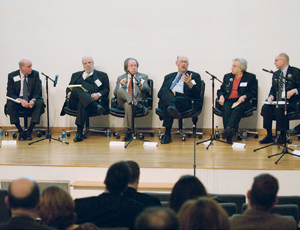With waves of bad news rolling in from Wall Street and Main Street, the Society of Marketing for Professional Services Foundation held a think tank to explore "The Upside of a Down Economy." Participants at the Feb. 20 conference in Atlanta found little in the way of an upside, but a panel of nine senior industry experts came away with a meaningful to-do list for firms hoping to cope—and even prosper—in an era of diminished opportunity.

Top on that list is the need for professional service firms to break from a reactive, order-taking approach to business development. With clients strapped for cash and facing their own economic crises, AEC firms need to proactively engage clients.
"We’re going through a new reality," said M. J. "Skip" Beebe, retired chief learning officer of CB Richard Ellis. "Our clients don’t have clear answers to their business problems. We need to engage them in a conversation like we never have before."
"You need to come up with new solutions for your clients," said Diane C. Creel, former CEO of Earth Tech. To be successful in a down economy, A-E firms need to spend more time with clients with an eye to gaining sole-source work.
"It’s going to be survival of the most adaptive, not survival of the fittest," agrees Joseph Powell, executive director of the Rice Building Institute at Rice University, Houston. He says A-E firm principals need to "spend less time talking among your peers and more time talking to your clients."
Stimulus measures enacted by Congress and the Obama administration, while helpful, will not significantly impact the general outlook for business. The amounts slated for additional federal spending in 2009 in nonresidential construction, one panelist noted, is "just too small to make a difference." Even stimulus spending for state highway work in 2009—the largest section of the stimulus—is "a drop in the bucket," said Laurin McCracken, chief marketing officer for Jacobs Global Buildings NA.

POWELL
Panelists agreed the virtual collapse of the credit and bond markets for new project financing was the single biggest factor holding back new projects. The stimulus package "pales in comparison to the credit issues we’re facing," said Al Potter, chief strategy officer for Gilbane Building Co.
"The sources of funding are just not there," agreed Art Gensler, chairman of San Francisco-based Gensler. He says there are 250 major projects on hold at his firm. Gensler related a story in which his firm was days away from signing a design-services contract totaling $850 million for a major project in Dubai, only to have the plug pulled. With the current global outlook, he says, "In my lifetime you won’t see another project of that type."
Another less visible issue killing the ability to finance new project starts is the unprecedented overhang of existing commercial mortgage backed securities. Beebe noted that the amount of loans coming due on commercial properties over the next three years, including many that are already financially distressed, "is just staggering." Banks are so highly leveraged with existing real estate loan portfolios that they can’t make new loans, added McCracken. "Until that huge debt load gets corrected, they can’t lend money on new projects," he said.
Turning to the business outlook, all agreed the current economic downturn is fundamentally more severe than previous recessions. Based on recent research, James P. Cramer, publisher of Design Intelligence, Norcross, Ga., estimates that a net loss of $7 billion in design fees will occur over the next 18 months in the U.S. design market. "There will be deep cuts at design firms," in some cases up to 50% of staff, he said.
Potter pointed out that the AEC industry in the U.S. has had a relatively uninterrupted growth for the last 16 years. That run of growth has clearly been interrupted, with owners putting projects on hold and financing almost nonexistent. "This downturn does feel different, doesn’t it?" he asked.



Post a comment to this article
Report Abusive Comment